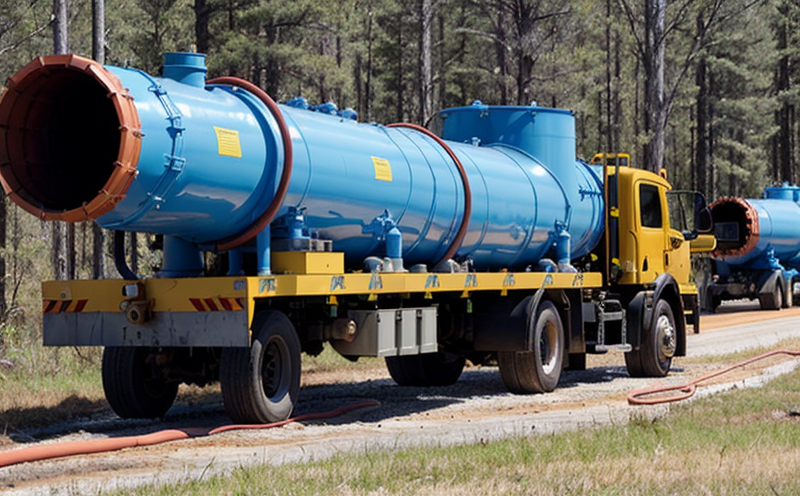API 570 Piping Inspection and Testing in Gas Distribution Systems
The American Petroleum Institute (API) standard API 570 sets forth comprehensive guidelines for the inspection, testing, and evaluation of pipeline systems used in natural gas distribution. This service is particularly critical for ensuring the safety, integrity, and reliability of pipelines that transport natural gas from source to consumer.
API 570 covers a wide range of inspections including internal and external assessments, non-destructive testing (NDT), and hydrostatic tests. The standard aims to identify potential flaws or defects before they can lead to catastrophic failures, which could result in significant property damage, environmental harm, and loss of life.
The scope of API 570 inspection includes:
- Visual examinations
- Dye penetrant testing
- Magnetic particle testing
- Ultrasonic testing
- Eddy current testing
- Hydrostatic testing
- Slewing and swiveling testing
- Other inspections as specified by the pipeline operator or regulatory bodies.
The API 570 standard ensures that all these inspections are conducted in a consistent, standardized manner to maintain high safety standards. It is crucial for quality managers, compliance officers, R&D engineers, and procurement professionals to understand this process as it directly impacts operational efficiency and safety.
Compliance with API 570 helps pipeline operators meet regulatory requirements, avoid costly downtime, ensure long-term asset integrity, and protect public safety. For instance, a utility company operating in a densely populated area faces higher scrutiny from regulatory bodies and the public. Ensuring compliance through regular inspections is not just a legal requirement but also a responsible business practice.
API 570 is particularly important for gas distribution systems where the integrity of the pipeline is paramount due to the high pressure and temperature conditions under which the pipelines operate. The standard provides detailed guidelines on how to conduct these inspections, including:
- Frequency of inspections
- Type of NDT methods
- Criteria for acceptance and rejection
- Reporting requirements
The standard also emphasizes the importance of a multi-step approach to pipeline integrity management. This includes not only inspection but also:
- Condition assessment
- Data analysis
- Failure mode identification
- Root cause analysis
- Corrective actions and maintenance planning
The API 570 standard is widely recognized globally for its comprehensive approach to pipeline integrity. It is aligned with other international standards such as ISO, EN, IEC, ASTM, and ASME, ensuring that the best practices are consistently applied across different regions.
For instance, a utility company in Europe might use API 570 alongside EN 14286 to ensure compliance with European regulations. Similarly, companies operating in North America would follow API 570 along with ASME codes for pipeline integrity.
Why It Matters
The importance of API 570 cannot be overstated, especially given the critical role that natural gas distribution plays in modern energy infrastructure. Pipelines are long-term investments that need to operate reliably and safely over decades. Any failure can have severe consequences:
- Leakage of natural gas leading to explosions
- Potential environmental damage from spills
- Hazardous emissions affecting public health
- Closure of critical infrastructure leading to economic losses
The standard ensures that every aspect of the pipeline's lifecycle is addressed, from initial construction through operation and maintenance. By adhering to API 570, companies not only meet regulatory requirements but also enhance their reputation for reliability and safety.
Moreover, compliance with this standard can help reduce insurance premiums by demonstrating a proactive approach to risk management. This, in turn, boosts investor confidence and operational efficiency. For quality managers and compliance officers, ensuring adherence to API 570 is essential for maintaining a robust pipeline network.
Industry Applications
| Application | Description |
|---|---|
| Natural Gas Distribution Pipelines | Involves the transportation of natural gas from production facilities to distribution points. |
| Pipeline Networks in Urban Areas | Critical for ensuring uninterrupted supply to residential and commercial areas. |
| Long-Distance Gas Transmission Pipelines | Used for high-pressure, high-volume gas transport over long distances. |
| Offshore Gas Pipelines | Transport natural gas from offshore platforms to onshore facilities. |
| Pipelines in Remote Locations | Ensure reliable supply of natural gas to remote communities and industrial sites. |
The API 570 standard is applicable to all these applications, ensuring that the pipelines are safe and reliable. The standard's comprehensive approach ensures that even the most challenging environments can be addressed effectively.
Use Cases and Application Examples
- New Pipeline Construction: API 570 is used during the initial stages of pipeline construction to ensure that the material, welding, and installation processes meet safety standards.
- Operational Pipelines: Regular inspections are conducted using NDT methods to identify potential defects or corrosion before they lead to failures.
- Maintenance and Repair: When a defect is identified during an inspection, API 570 provides guidelines for repair procedures and replacement of affected sections.
The use cases for API 570 are diverse. For example, in urban areas, pipelines need to be inspected frequently due to the high population density and potential risks associated with gas leaks. In offshore locations, where environmental conditions are harsh, API 570 ensures that inspections are conducted under challenging circumstances.





